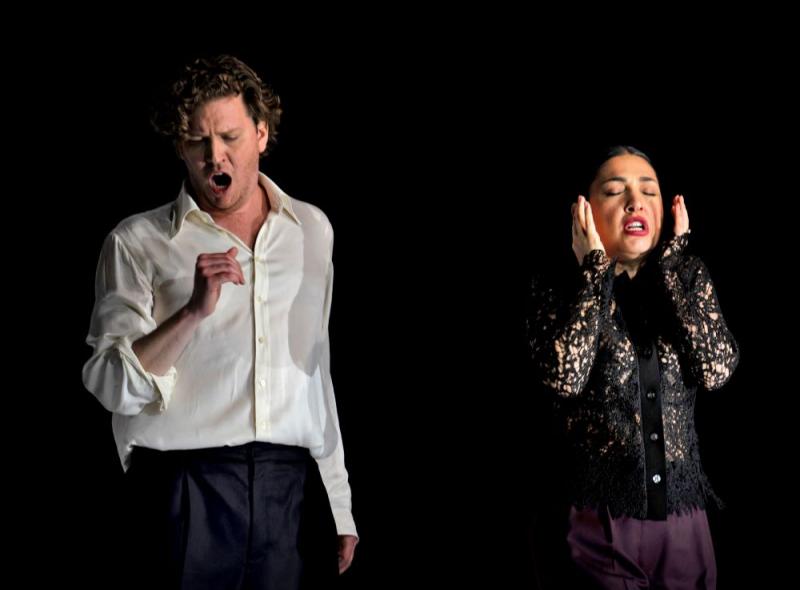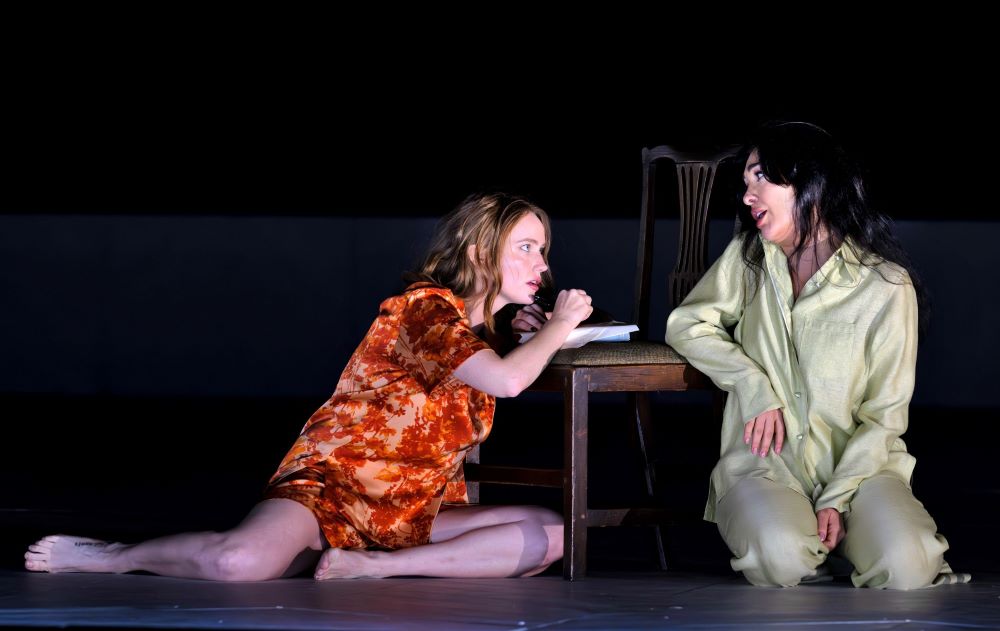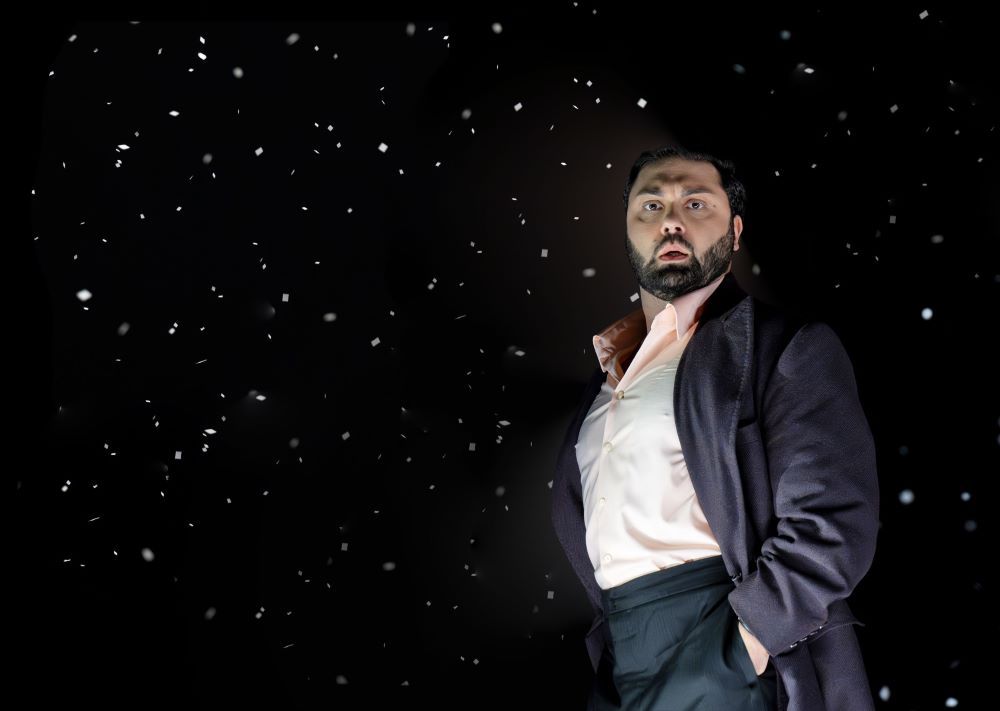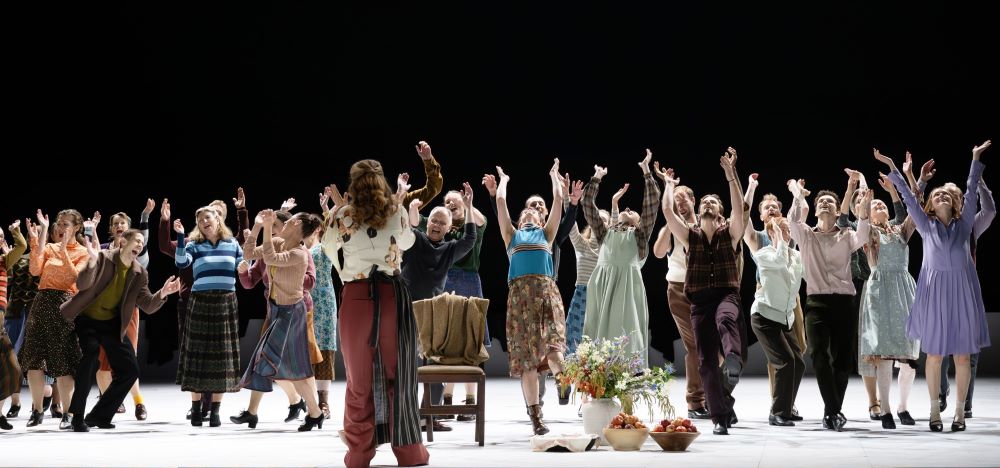Eugene Onegin, Royal Opera review - the heart left cold | reviews, news & interviews
Eugene Onegin, Royal Opera review - the heart left cold
Eugene Onegin, Royal Opera review - the heart left cold
Promising youth trapped between exaggerated conducting and cool production

Emotional truth is elusive in Tchaikovsky’s “lyrical scenes” after Pushkin’s verse-novel. Overstress every feeling, as conductor Henrik Nánási did last night, and you leave some of us in the audience feeling manipulated. Play it cool, which is what we mostly get in Ted Huffman’s new production, and the heart is similarly untouched.
There shouldn’t be a problem with modern dress – mostly stylish and colour-co-ordinated from costume designer Astrid Klein – even if here it doesn’t give us a sense of place (Hyemi Shin's grey stage leaves room only for a few props). That wouldn’t matter if the intensity of feeling in the main characters – above all young Tatyana and supposedly devastated older Onegin, who loves her too late – were present to match Nánási’s insistence. Just one example: as Nánási’s orchestra throbs Tatyana’s uncontrollable passion at the start of Tchaikovsky's famous Letter Scene, soprano Kristina Mkhitaryan shows us nothing like the same in her body language (think back to Elena Prokina for Graham Vick, Ekaterina Shcherbachenko for Dmitri Tcherniakov).  Mkhitaryan is vocally stunning, with a full, fearless and luminous upper register, but nothing less than lived realisation of adolescent extremes will do. Huffman’s glosses would work better if those extremes registered: unbridled Olga coming in to take dictation as Tatyana composes her love-letter to Onegin (Mkhitaryan and Avery Amereau pictured above), then caught at the beginning of the party scene virtually in flagrante with him, a duel scene which ends, let’s just say, not in the usual way.
Mkhitaryan is vocally stunning, with a full, fearless and luminous upper register, but nothing less than lived realisation of adolescent extremes will do. Huffman’s glosses would work better if those extremes registered: unbridled Olga coming in to take dictation as Tatyana composes her love-letter to Onegin (Mkhitaryan and Avery Amereau pictured above), then caught at the beginning of the party scene virtually in flagrante with him, a duel scene which ends, let’s just say, not in the usual way.
Much is delivered at the footlights, Onegin presenting himself with a bow and Lensky signing off with one before taking a chair at the back of the usually empty stage, so Lensky’s aria certainly works in the ideal delivery of Liparit Avetisyan (pictured below). Brindley Sherratt, a late replacement as Tatyana’s older husband Prince Gremin (who is nothing but an aria, yet what an aria), gave a masterclass in bass delivery. Others fail emotionally because of Nánási's extreme tempi: way too slow for the fragile heart of Tatyana’s big scene, too fast for Onegin’s rejection, which gives us nothing of the 19-year-old’s struggle to find his soul and denies Gordon Bintner a legato sheen (it’s always fascinated me that the line here is a more curtailed version of Tatyana’s deepest confessional).  Tchaikovsky doesn’t make it easy for the nominally main character, focusing on Tatyana in Act One, Lensky in Act Two and Onegin only in Act Three. But Bintner simply comes across as a cold fop, a kind of Bentley Drummle with correct social graces (three air-kisses to all, nicely mirrored in Act Three), and then as a returning wanderer seven years later hardly marked by his experience. On the first night, at least, the passionate final scene was too much for him; unlike Mkhitaryan and Avetistyan, he lacked power at the top of the voice.
Tchaikovsky doesn’t make it easy for the nominally main character, focusing on Tatyana in Act One, Lensky in Act Two and Onegin only in Act Three. But Bintner simply comes across as a cold fop, a kind of Bentley Drummle with correct social graces (three air-kisses to all, nicely mirrored in Act Three), and then as a returning wanderer seven years later hardly marked by his experience. On the first night, at least, the passionate final scene was too much for him; unlike Mkhitaryan and Avetistyan, he lacked power at the top of the voice.
Perhaps the best acting comes from Avery Amereau’s crucially enlarged role as the fickle sister, later warder of Tatyana’s two children (another perfectly fine gloss). Among the smaller roles, only Jamie Woollard’s second at the duel, Zaretsky, is ideally strong; as clown Triquet at Tatyana’s name-day party, Christophe Mortagne sounds stretched, but again Nanasi’s slow speed for his couplets doesn’t help.  The “peasants” in Act One sound too English, but all the song-and-dance scenes are well enough choreographed by Lucy Burge, albeit with obvious spotlight on the professional movers. Nánási always gets a vivid sound from the Royal Opera Orchestra; the Waltz and Polonaise have real vivid dash. Why, though, does Huffman favour the Ecossaise of Tchaikovsky’s revision for a big Imperial Theatres staging when the original would serve his avowal of stripped-down music drama much better? It’s one of many anomalies in a disappointing evening,
The “peasants” in Act One sound too English, but all the song-and-dance scenes are well enough choreographed by Lucy Burge, albeit with obvious spotlight on the professional movers. Nánási always gets a vivid sound from the Royal Opera Orchestra; the Waltz and Polonaise have real vivid dash. Why, though, does Huffman favour the Ecossaise of Tchaikovsky’s revision for a big Imperial Theatres staging when the original would serve his avowal of stripped-down music drama much better? It’s one of many anomalies in a disappointing evening,
rating
Explore topics
Share this article
Add comment
The future of Arts Journalism
You can stop theartsdesk.com closing!
We urgently need financing to survive. Our fundraising drive has thus far raised £49,000 but we need to reach £100,000 or we will be forced to close. Please contribute here: https://gofund.me/c3f6033d
And if you can forward this information to anyone who might assist, we’d be grateful.

Subscribe to theartsdesk.com
Thank you for continuing to read our work on theartsdesk.com. For unlimited access to every article in its entirety, including our archive of more than 15,000 pieces, we're asking for £5 per month or £40 per year. We feel it's a very good deal, and hope you do too.
To take a subscription now simply click here.
And if you're looking for that extra gift for a friend or family member, why not treat them to a theartsdesk.com gift subscription?
more Opera
 The Railway Children, Glyndebourne review - right train, wrong station
Talent-loaded Mark-Anthony Turnage opera excursion heads down a mistaken track
The Railway Children, Glyndebourne review - right train, wrong station
Talent-loaded Mark-Anthony Turnage opera excursion heads down a mistaken track
 La bohème, Opera North review - still young at 32
Love and separation, ecstasy and heartbreak, in masterfully updated Puccini
La bohème, Opera North review - still young at 32
Love and separation, ecstasy and heartbreak, in masterfully updated Puccini
 Albert Herring, English National Opera review - a great comedy with depths fully realised
Britten’s delight was never made for the Coliseum, but it works on its first outing there
Albert Herring, English National Opera review - a great comedy with depths fully realised
Britten’s delight was never made for the Coliseum, but it works on its first outing there
 Carmen, English National Opera review - not quite dangerous
Hopes for Niamh O’Sullivan only partly fulfilled, though much good singing throughout
Carmen, English National Opera review - not quite dangerous
Hopes for Niamh O’Sullivan only partly fulfilled, though much good singing throughout
 Giustino, Linbury Theatre review - a stylish account of a slight opera
Gods, mortals and monsters do battle in Handel's charming drama
Giustino, Linbury Theatre review - a stylish account of a slight opera
Gods, mortals and monsters do battle in Handel's charming drama
 Susanna, Opera North review - hybrid staging of a Handel oratorio
Dance and signing complement outstanding singing in a story of virtue rewarded
Susanna, Opera North review - hybrid staging of a Handel oratorio
Dance and signing complement outstanding singing in a story of virtue rewarded
 Ariodante, Opéra Garnier, Paris review - a blast of Baroque beauty
A near-perfect night at the opera
Ariodante, Opéra Garnier, Paris review - a blast of Baroque beauty
A near-perfect night at the opera
 Cinderella/La Cenerentola, English National Opera review - the truth behind the tinsel
Appealing performances cut through hyperactive stagecraft
Cinderella/La Cenerentola, English National Opera review - the truth behind the tinsel
Appealing performances cut through hyperactive stagecraft
 Tosca, Royal Opera review - Ailyn Pérez steps in as the most vivid of divas
Jakub Hrůša’s multicoloured Puccini last night found a soprano to match
Tosca, Royal Opera review - Ailyn Pérez steps in as the most vivid of divas
Jakub Hrůša’s multicoloured Puccini last night found a soprano to match
 Tosca, Welsh National Opera review - a great company reduced to brilliance
The old warhorse made special by the basics
Tosca, Welsh National Opera review - a great company reduced to brilliance
The old warhorse made special by the basics
 BBC Proms: The Marriage of Figaro, Glyndebourne Festival review - merriment and menace
Strong Proms transfer for a robust and affecting show
BBC Proms: The Marriage of Figaro, Glyndebourne Festival review - merriment and menace
Strong Proms transfer for a robust and affecting show
 BBC Proms: Suor Angelica, LSO, Pappano review - earthly passion, heavenly grief
A Sister to remember blesses Puccini's convent tragedy
BBC Proms: Suor Angelica, LSO, Pappano review - earthly passion, heavenly grief
A Sister to remember blesses Puccini's convent tragedy

Comments
Can Covent Garden no longer
Can Covent Garden no longer afford scenary? People wondering on with a kitchen chair or two was ridiculous. The bare cavernous stage set no atmosphere at all . When the dead Lensky got up and walked off stage the whole production completely lost any vestige of credibilty it might have had.
Very disappointing evening.
I’m glad to see I’m not the
I’m glad to see I’m not the only one who was amused by yesterday’s performance. As the author of the article rightly points out, modern interpretation isn’t the issue—the performance itself is the problem. Whether it was Gordon Bintner, Ted Huffman, or both, they simply missed the mark. For me, Onegin was a disaster from every angle. Tatyana in the final act didn’t feel like Tatyana, and the duel scene was simply shocking. Why? To show, perhaps, to those unfamiliar with the original Onegin that he’s some sort of 'Balkonsky'? Nonsense! This presentation of the duel scene completely destroyed Lensky’s character in the process. And then there’s the vocal performance—ROH simply cannot afford to have vocals that poor.
That said, I did enjoy the evening overall, though it was more amusing than anything else—not exactly what one expects when attending a production that draws on such a masterpiece as Onegin from Pushkin, Tchaikovsky, and ROH.
Hello David, I agree with
Hello David, I agree with your comments. Opera demands emotional engagement especially Onegin I'd say. Interesting to read the Guardian review which had a very different take, either that or it was written by the House :-). For me also a very disappointing evening.
Perhaps Nanasi found a cooler
Perhaps Nanasi found a cooler temperature for this performance, presumably from later in the run, but I find the conducting almost invariably very fine. Should Nanasi be leaning on every line, every emotion, distorting the music out of whack, I would have caught on long before the final scene, which I have on now, that he is engaging in this practice. I listen to this two days after attending the Met Tosca, really quite badly conducted by Nezet-Seguin, along lines, David, you say you have found with Nanasi here - and I wait in vain. If anything, this Onegin is a huge antidote to what I heard, though a much different opera, this past Saturday.